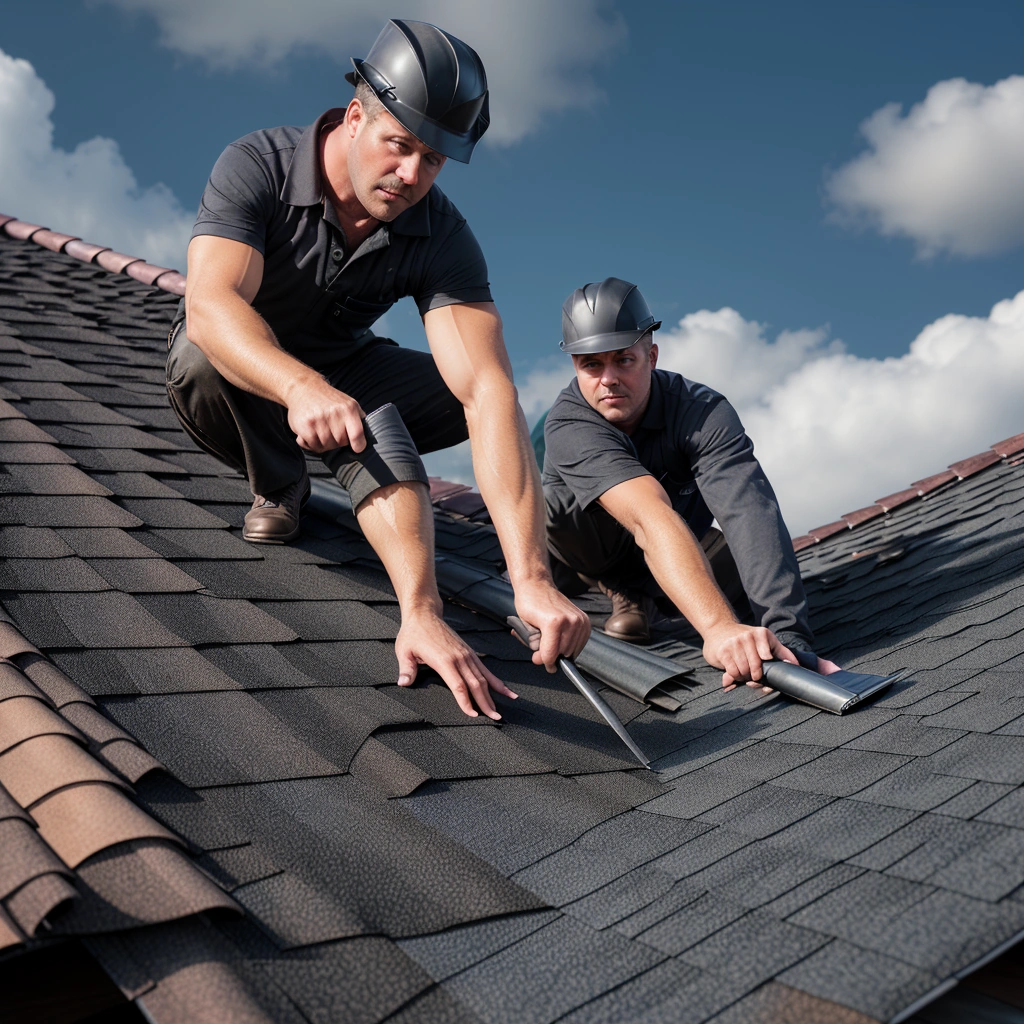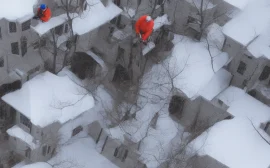Unveiling the Roofing Scam Epidemic: Protecting Your Home and Wallet
The promise of a new roof, or a much-needed repair, can be a beacon of hope for homeowners facing leaks, damage, or simply the wear and tear of time. However, this vulnerable position makes them prime targets for unscrupulous individuals and fraudulent roofing companies. Roofing scams are a pervasive problem, costing homeowners thousands of dollars and leaving them with shoddy workmanship, incomplete projects, or even no work at all after paying a deposit. This article serves as a comprehensive guide to identifying and avoiding these scams, empowering you to protect your home and your finances.
Roofing fraud manifests in various forms, often preying on homeowners’ lack of expertise in construction and roofing practices. For instance, ‘storm chasers’ frequently target areas hit by severe weather, offering seemingly quick and affordable roof repair scams. These individuals often use inferior materials, perform substandard work that fails to meet building codes, or simply take the deposit and disappear, leaving homeowners with further damage and financial loss. According to the National Insurance Crime Bureau (NICB), complaints related to contractor scams, including roofing contractor scams, spike significantly after major weather events, highlighting the urgency for homeowners to be vigilant and informed.
Beyond storm chasers, other common home improvement scams involve deceptive sales tactics, falsified credentials, and inflated damage assessments. A fraudulent roofing company might exaggerate the extent of the damage to justify unnecessary roof replacement scams, or they may claim to have found hidden problems that require immediate attention and additional costs. Some contractors may even lack the required roofing license and roofing insurance, leaving homeowners liable for any accidents or damages that occur during the project.
Therefore, understanding the red flags associated with these scams is crucial for homeowners seeking legitimate roof repairs or replacements. Learning how to avoid roofing scams can save you significant money and stress. Protecting your home from fraudulent roofing companies requires a proactive approach. This article will equip you with the knowledge and tools necessary to identify and avoid roofing scams. We will delve into common scam tactics, provide guidance on verifying credentials and checking references, emphasize the importance of obtaining multiple estimates and detailed contracts, and empower you to trust your gut when something feels amiss. By staying informed and taking the necessary precautions, you can ensure that your roofing project is handled by a reputable and trustworthy roofing contractor, safeguarding your home and your hard-earned money.
Common Roofing Scam Tactics: From Storm Chasers to Phantom Contractors
One of the most prevalent roofing scams involves ‘storm chasers,’ who are essentially transient contractors that aggressively target neighborhoods recently impacted by severe weather. These individuals capitalize on homeowners’ immediate need for roof repair or replacement, often lacking the requisite local licensing, insurance coverage, and proven experience to perform quality work. Storm chasers frequently employ high-pressure sales tactics, such as door-to-door solicitations and scare tactics, emphasizing the urgency of repairs and exaggerating the extent of the damage to coerce homeowners into signing contracts prematurely.
Their initial bids may appear attractively low, but this is often a deceptive ploy to secure the job, with costs escalating significantly later through hidden fees or unnecessary work. Homeowners should be especially wary of unsolicited offers and immediate demands for contract signatures, as these are hallmarks of roofing fraud. Another common tactic is the ‘phantom contractor’ scheme, a particularly devastating form of home improvement scams. In this scenario, a roofer demands a substantial upfront deposit to cover the cost of materials or labor, then disappears without completing the contracted work or providing any materials.
This leaves homeowners not only with a damaged roof but also with significant financial losses and the added burden of finding a reputable roofing contractor to rectify the situation. To avoid falling victim to this scam, always thoroughly vet any roofing contractor before hiring them, checking their references, online reviews, and verifying their physical business address. Insist on a detailed, written contract that clearly outlines the scope of work, payment schedule, and materials to be used, and avoid paying a large percentage of the total cost upfront.
Beyond these tactics, some unscrupulous roofing contractors may resort to intentionally damaging a roof to inflate the repair costs or using substandard materials while charging for premium ones. This can be difficult for homeowners to detect without a professional inspection. Always obtain multiple estimates from different roofing companies to compare the proposed scope of work and materials. Furthermore, be cautious of roofing contractors who offer to waive your deductible – this seemingly generous offer is often illegal and can be a red flag for other fraudulent activities.
Roofing insurance policies are designed to share the cost of repairs between the homeowner and the insurer, and waiving the deductible can be a form of insurance fraud, potentially leading to legal consequences for both the contractor and the homeowner. By understanding these common roofing scams and taking proactive steps to protect yourself, you can avoid becoming a victim of roofing fraud and ensure that your roof repair or replacement is handled professionally and ethically.
Due Diligence: Verifying Credentials and Checking References
The first line of defense against roofing scams is thorough research, acting as your shield against fraudulent roofing companies. Always verify that the roofing contractor is licensed and insured in your state or locality. This isn’t merely a suggestion; it’s a critical step. Check their roofing license status with the relevant licensing board – a quick online search can often reveal whether a license is valid, expired, or nonexistent. Confirm their roofing insurance coverage with their insurance provider, specifically requesting proof of both general liability and worker’s compensation.
This protects you from liability should accidents occur on your property during the roof repair or roof replacement scams. Beyond the basics of licensing and insurance, delve into the contractor’s reputation. Read online reviews on multiple platforms, not just their website. Look for patterns in the feedback – are there consistent complaints about poor workmanship, communication issues, or hidden fees? Check their rating with the Better Business Bureau (BBB), paying attention to both the letter grade and the number of complaints filed against them.
A high rating doesn’t guarantee a perfect experience, but it does indicate a commitment to resolving customer issues. Be particularly wary of storm chasers who appear after major weather events, promising quick fixes but often delivering shoddy work or disappearing with your money. These individuals frequently exploit homeowners desperate for immediate roof repair. Ask for references from previous clients and contact them directly to inquire about their experience with the roofing contractor. Don’t just ask if they were satisfied; delve deeper.
Ask about the quality of the work, the contractor’s communication style, whether the project stayed on budget and on schedule, and if there were any unexpected issues. A reputable roofing contractor will be transparent and willing to provide this information readily. If a contractor hesitates or refuses to provide references, consider it a major red flag. Remember, avoiding roofing scams requires proactive investigation and a healthy dose of skepticism. Failing to do your due diligence can leave you vulnerable to home improvement scams and roof repair scams, costing you significant time, money, and stress. Protect your home by taking the time to verify credentials and check references before signing any contract.
The Power of Multiple Estimates and Detailed Contracts
Obtain multiple estimates from different roofing contractors before making a decision. This crucial step allows you to compare not only pricing but also the proposed scope of work and the contractor’s overall approach to your project. Be wary of contractors who provide estimates that are significantly lower than others, as this could indicate substandard materials or workmanship, a lack of proper insurance, or even a deliberate attempt to lure you in with a low initial price that will later balloon with hidden fees.
Remember, the cheapest option isn’t always the best, especially when it comes to protecting your home from the elements. For example, a drastically low estimate for roof replacement scams might involve using thinner, less durable shingles or skipping essential underlayment, leading to premature failure and costly repairs down the line. Ensure that the estimate is detailed and includes a breakdown of all costs, including materials (specifying brand and type), labor, underlayment, flashing, permits, and disposal fees.
A vague estimate is a red flag, as it leaves room for the contractor to add unexpected charges later on. A legitimate roofing contractor will provide a written contract that clearly outlines the scope of work, payment schedule, start and completion dates, and warranty information. The contract should also specify who is responsible for obtaining necessary permits and adhering to local building codes. Scrutinize the warranty details carefully, noting the duration of coverage and what is specifically covered.
Understanding these details is vital to avoid roofing fraud. Never pay the full amount upfront; a reasonable deposit (typically 10-30%) is acceptable to cover initial material costs, but avoid contractors who demand a large percentage of the total cost before starting the work. This is a common tactic used in home improvement scams, and it leaves you vulnerable if the contractor disappears or performs shoddy work. Instead, structure the payment schedule to coincide with key milestones in the project, such as material delivery, completion of tear-off, and final inspection.
Before making the final payment, thoroughly inspect the completed work to ensure it meets your expectations and the terms outlined in the contract. If you identify any issues, document them with photos and videos and communicate them to the contractor immediately. Retain copies of all estimates, contracts, payment receipts, and communication for your records, as these may be needed if you encounter any disputes or need to file a claim with your insurance company. Taking these precautions can significantly reduce your risk of becoming a victim of roofing scams and ensure a successful roof repair or replacement project.
Trust Your Gut: Recognizing Red Flags and Questionable Behavior
Pay close attention to the contractor’s communication and professionalism. A reputable roofing contractor will be responsive to your questions and concerns, provide clear and concise explanations of the proposed work, and treat you with respect. This includes promptly returning calls, arriving on time for appointments, and patiently answering all inquiries without condescension. Be wary of contractors who use high-pressure sales tactics, such as insisting on immediate decisions or creating a false sense of urgency by claiming limited-time offers.
These are common red flags in home improvement scams, often employed by storm chasers looking to capitalize on vulnerable homeowners after severe weather. Remember, a legitimate roofing contractor understands that a roof replacement or significant roof repair is a major investment and will allow you the time needed to make an informed decision. Trust your instincts; if something feels off during your interactions with a potential roofing contractor, it’s best to err on the side of caution and seek a second opinion.
This intuition can be a powerful tool in avoiding roofing fraud. Perhaps the contractor is evasive about providing their roofing license number or proof of roofing insurance, or maybe their explanation of the necessary repairs doesn’t quite align with what other professionals have told you. These subtle inconsistencies can be warning signs of a potential scam. Always remember that reputable contractors are transparent and forthcoming with information, eager to earn your trust through honesty and integrity.
Don’t dismiss your gut feeling – it could save you from significant financial loss and shoddy workmanship. Document everything meticulously, including all communications, estimates, contracts, and payments. This paper trail is crucial if you later discover you’ve been targeted by a roof repair scam or roof replacement scam. Keep copies of all emails, text messages, and written correspondence with the roofing contractor. Ensure that the contract clearly outlines the scope of work, materials to be used, payment schedule, and warranty information. Take photos or videos of the roof before, during, and after the repairs or replacement. This documentation will be invaluable if you need to file a complaint with consumer protection agencies, your insurance company, or even pursue legal action against fraudulent roofing companies. By maintaining a comprehensive record, you empower yourself to effectively address any issues that may arise and protect your home and finances from home improvement scams.
Staying Vigilant: Protecting Your Home and Finances from Roofing Fraud
Roofing scams can be financially and emotionally devastating, turning the dream of a secure home into a homeowner’s nightmare. However, by being informed, proactive, and understanding the common tactics employed by fraudulent roofing companies, you can significantly reduce your risk of becoming a victim of roof repair scams or roof replacement scams. Remember the core tenets of consumer protection: verify credentials diligently, obtain multiple detailed estimates to compare bids and scope, scrutinize contracts with a fine-toothed comb, and, crucially, trust your instincts when something feels amiss.
These precautions are your shield against contractor scams and ensure you partner with a reputable roofing contractor committed to quality workmanship and protecting your investment. The stakes are high; according to the National Insurance Crime Bureau (NICB), complaints related to home improvement scams, including roofing fraud, spike dramatically after major weather events, highlighting the urgency of vigilance. Beyond the immediate financial loss, roofing scams often lead to long-term structural damage to your home, further compounding the problem.
For instance, storm chasers, notorious for descending on communities after severe weather, may offer quick fixes with substandard materials and shoddy workmanship. These ‘repairs’ often fail to meet local building codes, leaving homeowners vulnerable to future leaks, mold growth, and even structural collapse. Before hiring anyone, always verify their roofing license with your state’s licensing board and confirm their roofing insurance coverage. A legitimate roofing contractor will readily provide this information and should be listed in reputable industry associations.
Don’t hesitate to contact the Better Business Bureau (BBB) to check for any complaints or negative reviews associated with the company. Protecting your home from roofing scams also involves understanding the red flags that signal potential trouble. Be wary of contractors who demand a large upfront payment before any work begins, pressure you into signing a contract immediately, or offer estimates that seem too good to be true. These are common tactics used by fraudulent roofing companies to take your money and disappear, leaving you with unfinished or poorly executed work.
Furthermore, a reputable roofing contractor will be transparent about the materials they use, the scope of the project, and the timeline for completion. They will also be willing to answer your questions and address your concerns in a professional and courteous manner. By staying vigilant, asking the right questions, and doing your due diligence, you can avoid roofing scams and ensure that your roof is repaired or replaced by a qualified and trustworthy professional, safeguarding both your home and your finances.



